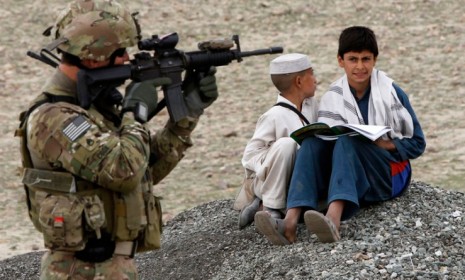4 signs that America's Afghan exit strategy is unraveling
Violence surges over an anti-Islam film. Afghan soldiers are attacking Western troops. And peace talks are at a standstill

A free daily email with the biggest news stories of the day – and the best features from TheWeek.com
You are now subscribed
Your newsletter sign-up was successful
President Obama plans to bring American troops home from Afghanistan by the end of 2014, and hand over security responsibilities to Afghan forces. Skeptics, however, say the timetable will be hard to meet as the U.S.-led coalition faces rising violence, especially insider attacks by Afghan security forces against their foreign counterparts. This year, 51 international troops have been killed in these "green on blue" attacks, presenting what Chairman of the Joint Chiefs of Staff Gen. Martin Dempsey called a "very serious threat to the campaign." Is the exit strategy put together by the U.S. and its NATO allies falling apart? Here, four recent signs that it might be:
1. Afghan soldiers aren't getting the training they need
The American-led military coalition in Afghanistan announced this week that it is curtailing joint patrols between foreign and Afghan forces. That's "a significant blow to a core element of the Western exit strategy," says Matthew Rosenberg at The New York Times, because those operations are a critical part of the on-the-job training Afghan soldiers and police officers will need if they're to fill the shoes of the American and NATO troops. NATO commanders, who are trying to weed out Taliban infiltrators from Afghanistan's 352,000-strong security forces, insist the change is only a temporary tactical shift to reduce the risks NATO troops face, say David Stringer and Slobodan Lekic of The Associated Press. "The goal is unchanged," says NATO Secretary-General Anders Fogh Rasmussen. "The strategy remains the same and the timeline remains the same."
The Week
Escape your echo chamber. Get the facts behind the news, plus analysis from multiple perspectives.

Sign up for The Week's Free Newsletters
From our morning news briefing to a weekly Good News Newsletter, get the best of The Week delivered directly to your inbox.
From our morning news briefing to a weekly Good News Newsletter, get the best of The Week delivered directly to your inbox.
2. Violence is surging over an anti-Islam film
"Attacks using the anti-Islam Innocence of Muslims video as a pretext have spread to Afghanistan," says Spencer Ackerman at Wired, making an already tense situation worse. A "dramatic assault" — reportedly in response to the video — killed two Marines and destroyed six Harrier jets at a remote Marine Base in Helmand Province, and a suicide bomber crashed her car into a mini-van carrying foreign U.S. contract workers, killing 14, in Kabul. Defense wonks were already warning that "U.S. commanders were so focused on fighting the Taliban that their instinctive impulses were to put training Afghans on the back burner." Those impulses must really be kicking in now.
3. The Taliban is targeting the handover plan
As the U.S. and NATO have swept Taliban fighters out of much of southern Afghanistan, says Rajiv Chandrasekaran at The Washington Post, Taliban commanders have adopted a new war plan. Instead of trying to retake lost ground, they're targeting the exit strategy itself. They have launched a campaign to "assassinate key Afghan government and security officials who are likely to play leadership roles in the country once foreign troops depart," and staged assaults on high-profile targets, including the U.S. embassy and fortified NATO bases. And there are signs their "political war" is working, as new doubts surface among Afghans about their government and security forces' ability to "keep the insurgents at bay" once foreign troops leave.
A free daily email with the biggest news stories of the day – and the best features from TheWeek.com
4. Peace discussions with the Taliban have failed
"Peace will not come simply by setting out an exit strategy for NATO troops," says the Financial Times in an editorial. There has to be a "political strategy for the future of Afghanistan that settles differences between all its ethnic groups and militant factions." Otherwise, the place descends into civil war between the government and the Taliban the moment we leave. Peace talks with the Taliban are an "essential component" in building the road to our exit, then, but they have gone nowhere. The main stumbling block is a proposed deal to exchange five Taliban prisoners at Guantanamo Bay for a U.S. soldier being held by insurgents. The idea was to divide the moderate Taliban elements from extremists, says Asif Haroon Raja at the Pakistan Observer. Instead, it's the U.S. that's divided, between diplomats favoring reconciliation and Pentagon leaders who think "force is the sole solution." As long as there's no clear path to a negotiated peace, the final phase will "wander in clouds of uncertainty. "